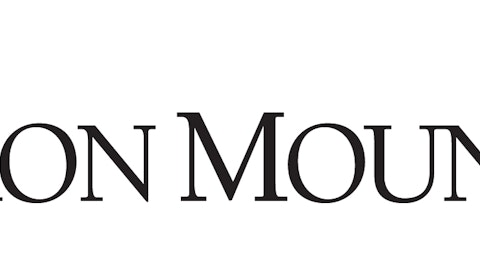
Why customers stay with the company
Iron Mountain Incorporated (NYSE:IRM) has low customer churn at less than 2% per year, with the average life of a box in storage estimated at around 15 years, according to its most recent earnings conference call. Iron Mountain derives strong recurring revenue from a stable customer base for two main reasons.
Firstly, there is an element of stickiness to Iron Mountain Incorporated (NYSE:IRM)’s document-storage business. For example, it is relatively easy to cancel a magazine subscription, which essentially means that magazines stop getting delivered to your house. On the contrary, if you choose to cancel the company’s document-storage services, all the boxes in storage will be returned. You will have a difficult task of finding space in the office to store all the documents, and implement the necessary system to be able to retrieve the documents on an as-needed basis.
Secondly, Iron Mountain Incorporated (NYSE:IRM) benefits from high customer switching costs, as customers will have to pay a permanent withdrawal charge in addition to the usual retrieval charge for each item to be withdrawn. The inconvenience, time wastage and the additional withdrawal charges typically outweigh any cost savings from a more price-competitive competitor.
Future outlook
Iron Mountain Incorporated (NYSE:IRM) reiterated its guidance for revenue growth between 0% and 3% for full-year fiscal 2013 in its first quarter of 2013 earnings release. Going forward, strong growth for its document-storage business is likely to be offset by reduced revenue related to the transportation of records and lower shredding activity.
In terms of organic growth, physical storage document customers should grow on the back of enhanced regulatory requirements on the retention of company records involving a longer duration and a wider range of content. Document- storage services make up only a very small proportion of the total cost structure for companies, but they help customers mitigate risks of penalties and fines related to failure to comply with document retention laws.
With the non-U.S. market accounting for only about a quarter of Iron Mountain’s revenue, there is also significant room for further international expansion. Management shared at its most recent earnings conference call, that storage rental revenue for emerging markets is growing at a CAGR of 6% to 12% compared with 1% to 3% for mature markets.
Successful REIT conversion is a potential catalyst
Iron Mountain Incorporated (NYSE:IRM) recently revealed that it received a “tentatively adverse” ruling from the IRS relating to its REIT conversion, according to an 8-K released in June. Despite this, I am confident that Iron Mountain will eventually still be able to obtain approval from IRS for its REIT conversion, albeit at a later date than the planned conversion date Jan. 1, 2014. My opinion is that Iron Mountain fits the mold, given its similarity to self-storage REITs.
Management mentioned at its 2012 Investor Day that it expects to double its dividends following a successful REIT conversion. The increase in dividends is likely to be driven by lower taxes, depreciation and amortization and the substitution of cheaper secured financing in favor of more expensive lease debt.
Peer comparison
Iron Mountain’s peers include Cintas Corporation (NASDAQ:CTAS) and Sovran Self Storage Inc (NYSE:SSS).




